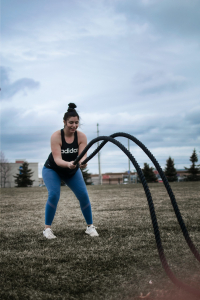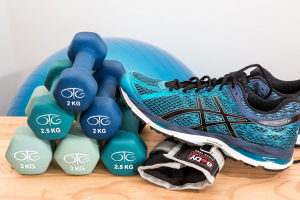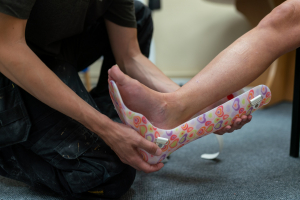There are hundreds of different options a person can choose from to help them stay fit. And we no longer need to go out to stay fit, though the human interaction and fresh air outdoors are a definite plus.
 We now have apps by which our instructors can show us how to do the perfect one-minute plank, our phones and watches can track how much exercise we’re getting, and we can be part of groups where we can post our progress and be kept accountable. The array of exercise choices can be a little daunting, but there’s never been a better time to improve your health and get fit.
We now have apps by which our instructors can show us how to do the perfect one-minute plank, our phones and watches can track how much exercise we’re getting, and we can be part of groups where we can post our progress and be kept accountable. The array of exercise choices can be a little daunting, but there’s never been a better time to improve your health and get fit.
Most Americans turn to exercise to get fit, and though the numbers have shifted over recent years, even more people could be doing more to have active lifestyles. Because of that, it may seem out of place to begin asking about over-exercising.
Surely, we’re trying to get more people to be active, and not asking those who are deep in it to start pulling back? Believe it or not, while being active and exercising may be good for you, there is a point at which your returns decline, and you begin to jeopardize your health and relationships.
Is there such a thing as over-exercising?
Overexercising is real. Even good things can be taken overboard and need moderation. Exercise is beneficial, but if you overdo it, you can find your gains being eroded and end up worse off for it. Here are a few signs that you’re overdoing it:
You feel tired more often than not. When done well, exercise tends to leave you feeling energized and in a good mood. If these are absent from your exercise, you may be overdoing it.
Your stamina declines. The typical trajectory is that the more we exercise, the stronger we feel and are. If you find yourself going backward – getting tired more easily, feeling less flexible, feeling weaker, unable to keep up with your previous pace – this may signal that you’re overdoing. Setting aside the general effects of getting older, if you notice this decline in stamina over a brief period, that points to overdoing it and your body not having enough recovery time.
 You exercise even in extreme weather conditions. If your form of exercise doesn’t require you to be out in extreme weather conditions, such as a heatwave, hailstorm, or snowstorm, but you choose to do it anyway, that may be a sign you’re overdoing it.
You exercise even in extreme weather conditions. If your form of exercise doesn’t require you to be out in extreme weather conditions, such as a heatwave, hailstorm, or snowstorm, but you choose to do it anyway, that may be a sign you’re overdoing it.
Your workouts leave you injured and sore long afterward. Mild pain and lingering soreness are par for the course for many good workouts. But if the pain lingers, your joints get inflamed, and your productivity in future exercise sessions is severely compromised, you may have been overdoing it.
Your life revolves around your exercise. When all you talk about is the last or next workout session, your social life, and other areas are scheduled around exercise, then you may be overdoing it and need to pull back a little.
In other words, if exercise dominates your life disproportionately, or it causes lingering pain that affects your functionality in life and for future workouts, it may be that you’re doing more than you ought to. The best thing you can do is moderate things and learn to create balance in your life.
The dangers of over-exercising
If over-exercise is a reality, knowing the dangers associated with it may be helpful. Some of the dangers of over-exercising have been hinted at already.
Undoing your gains. People have varied reasons for exercising. It may be to get fit and lose weight, to get better at something they enjoy, meet specific goals such as running a marathon, or to socialize with others with similar passions. Whatever your reasons for exercising are, overdoing it can set you back considerably.
 Constantly fatigue takes the enjoyment out of the activity and affects other areas of your life. Fatigue also makes you susceptible to poor eating choices – it’s easier to succumb to food cravings when you’re tired.
Constantly fatigue takes the enjoyment out of the activity and affects other areas of your life. Fatigue also makes you susceptible to poor eating choices – it’s easier to succumb to food cravings when you’re tired.
Additionally, the fatigue that results from overdoing exercise often doesn’t result in good sleep, which affects your resting metabolism and body’s ability to reduce stress and the levels of cortisol in your system that result from it. When you are stressed, your body holds onto fat. All this is to say that overdoing your exercise can hinder your goal to lose weight by working against you instead.
Injuring yourself will prevent you from exercising, meaning that you may not be able to meet your goals on schedule, and you may be unable to socialize with the people you exercised with. Overall, overexercise can undo your gains and potentially take away the things you love about your workout.
Incurring lifelong injuries. If you over-exercise, you may seriously injure yourself, or even put yourself in life-threatening situations. While some injuries can and do occur with regular exercise, you may ignore these warning signs and keep going when you’re overdoing it.
The result may be more permanent injuries that take months to heal or that will permanently alter your life. If you’re working out in hazardous conditions, you may put yourself at risk of heat stroke, or a bad fall. If you aren’t careful, you can injure yourself irreparably or at worst lose your life.
 Undermining your relationships. One of the risks of over-exercising is that your life gets organized around your exercise, and that can drive the people in your life up the wall. Romantic prospects may be put off by constant talk of skinless chicken breast, broccoli, and brown rice, or feeling like a secondary priority in your life.
Undermining your relationships. One of the risks of over-exercising is that your life gets organized around your exercise, and that can drive the people in your life up the wall. Romantic prospects may be put off by constant talk of skinless chicken breast, broccoli, and brown rice, or feeling like a secondary priority in your life.
The anecdote of the husband going for a run while his wife is in labor would be one example of taking things overboard, and it can have dire consequences for relationships. We need balance in our lives, and when one aspect of our existence dominates, that needs to be addressed, whether it’s work, play, exercise, or something else.
Being healthy about getting healthy
If think you may be over-exercising and you’ve noticed some of the signs pointed out above, the outlook is positive. You can take active steps to begin ramping down your exercise to levels that help you meet your goals.
Add variety to what you do. When you have something you’re good at and enjoy, it’s normal to want to go all out. While this may make sense for professional athletes (who have coaches, teams of physiotherapists, and so on to help them), for the average person we should still take our exercise seriously but be willing to add some variety to it.
If you’re into strength training, consider adding routines that will help you stretch your muscles to build flexibility. Lifting weights may be your thing but adding something else that emphasizes cardio fitness will help your overall health while giving your body time to recover from your workout sessions. Mixing it up with your exercise may also help you find other things you enjoy doing that can keep you healthy.
Active recovery days and rest days. Having scheduled days of rest is the best thing you can do for yourself. Those rest days can be days when you don’t do any exercise, but they can also be active recovery days when you focus on exercises such as stretching or meditation. Giving your body space to recover will enable you to perform better when you get back to it.
Additionally, if you’ve injured yourself, don’t push yourself to keep exercising. See a doctor, get rest, and allow your body to recover. Putting a cap on how much exercise you do allows you to create healthy boundaries for the sake of your overall well-being. Be clear with the people in your life what these boundaries are so that they can hold you accountable.
“Rope Exercise”, Courtesy of Ryan Gagnon, Unsplash.com, CC0 License; “Man of the House”, Courtesy of RyanMcGuire, Pixabay.com, CC0 License; “Dumbells and Shoes”, Courtesy of Stevepb, Pixabay.com, CC0 License; “Orthosis”, Courtesy of ThisIsEngineering, Pexels.com, CC0 License








